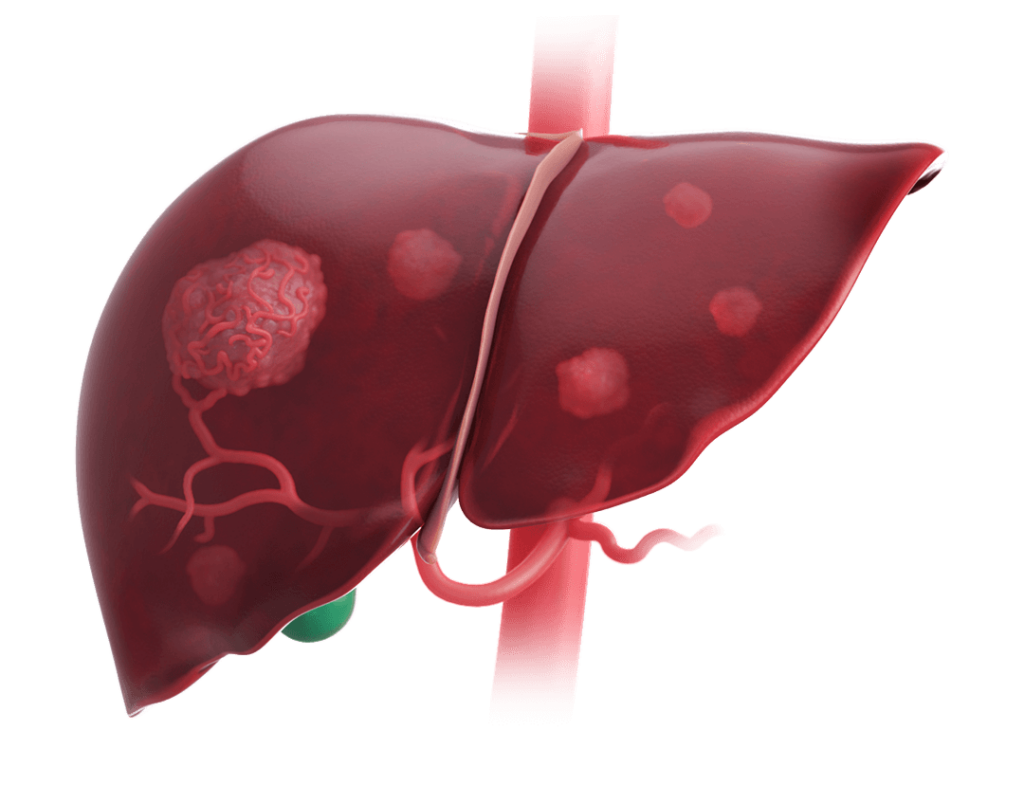Liver Cancer (Hepatocellular Carcinoma, Cholangiocarcinoma)

Overview
Liver cancer is a type of malignancy that begins in the cells of the liver. The two main primary liver cancers are:
- Hepatocellular carcinoma (HCC) – the most common type, usually arises in the setting of chronic liver disease
- Intrahepatic cholangiocarcinoma (bile duct cancer) – develops in the bile ducts within the liver
Symptoms
- Abdominal pain or swelling
- Weight loss and loss of appetite
- Jaundice (yellowing of the skin/eyes)
- Nausea or vomiting
- Fatigue
- Dark urine or pale stool
Causes & Risk Factors
- Chronic hepatitis B or C infection
- Cirrhosis (from alcohol, NAFLD, autoimmune hepatitis)
- Aflatoxin exposure
- Hemochromatosis and other genetic liver diseases
- Age >50, male sex
Diagnosis
- Liver function tests (ALT, AST, bilirubin)
- Tumor markers: AFP (for HCC), CA 19-9 (for cholangiocarcinoma)
- Imaging: CT, MRI with contrast, ultrasound
- Biopsy (if imaging is inconclusive)
Treatment Options
- Surgical resection (for localized disease)
- Liver transplantation (for select patients with cirrhosis and small tumors)
- Ablation (e.g., RFA or microwave)
- Transarterial chemoembolization (TACE) or radioembolization
- Systemic therapy (e.g., sorafenib, lenvatinib, immunotherapy)
Prognosis
- Depends on liver function and tumor stage
- 5-year survival:
- Localized HCC: ~35%
- Advanced/metastatic: <10%
- Cholangiocarcinoma often has poorer prognosis
Living with this Cancer Type
- Monitoring for liver function and complications (ascites, encephalopathy)
- Nutritional support and alcohol abstinence
- Managing side effects of systemic therapy
- Emotional and palliative care support
Prevention & Screening
- Hepatitis B vaccination
- Antiviral therapy for chronic HBV/HCV
- Regular surveillance (ultrasound and AFP every 6 months) for high-risk individuals
- Avoid alcohol and hepatotoxic drugs
FAQs
Q: Is liver cancer common?
A: It’s more common in Asia and Africa due to viral hepatitis prevalence.
Q: Can liver cancer be cured?
A: Yes, if detected early and treated with surgery or transplant.
Q: Who should get screened?
A: People with cirrhosis, chronic hepatitis B/C, or other liver disease.
Resources
- American Liver Foundation
- World Health Organization (Viral Hepatitis Program)
- ClinicalTrials.gov
Understand Precision Testing
Learn how liquid biopsy and chemo sensitivity testing can personalize your treatment plan.
Make Informed Decisions
Gain knowledge to actively participate in treatment discussions with your healthcare team.
Improve Treatment Outcomes
Discover how precision medicine and metabolic therapies can enhance treatment effectiveness.
Start Your Educational Journey Today
Empower yourself with knowledge about precision metabolic oncology and take an active role in your cancer care journey.
Need More Information?
Our team of oncology experts is here to help you understand your diagnosis and treatment options.
